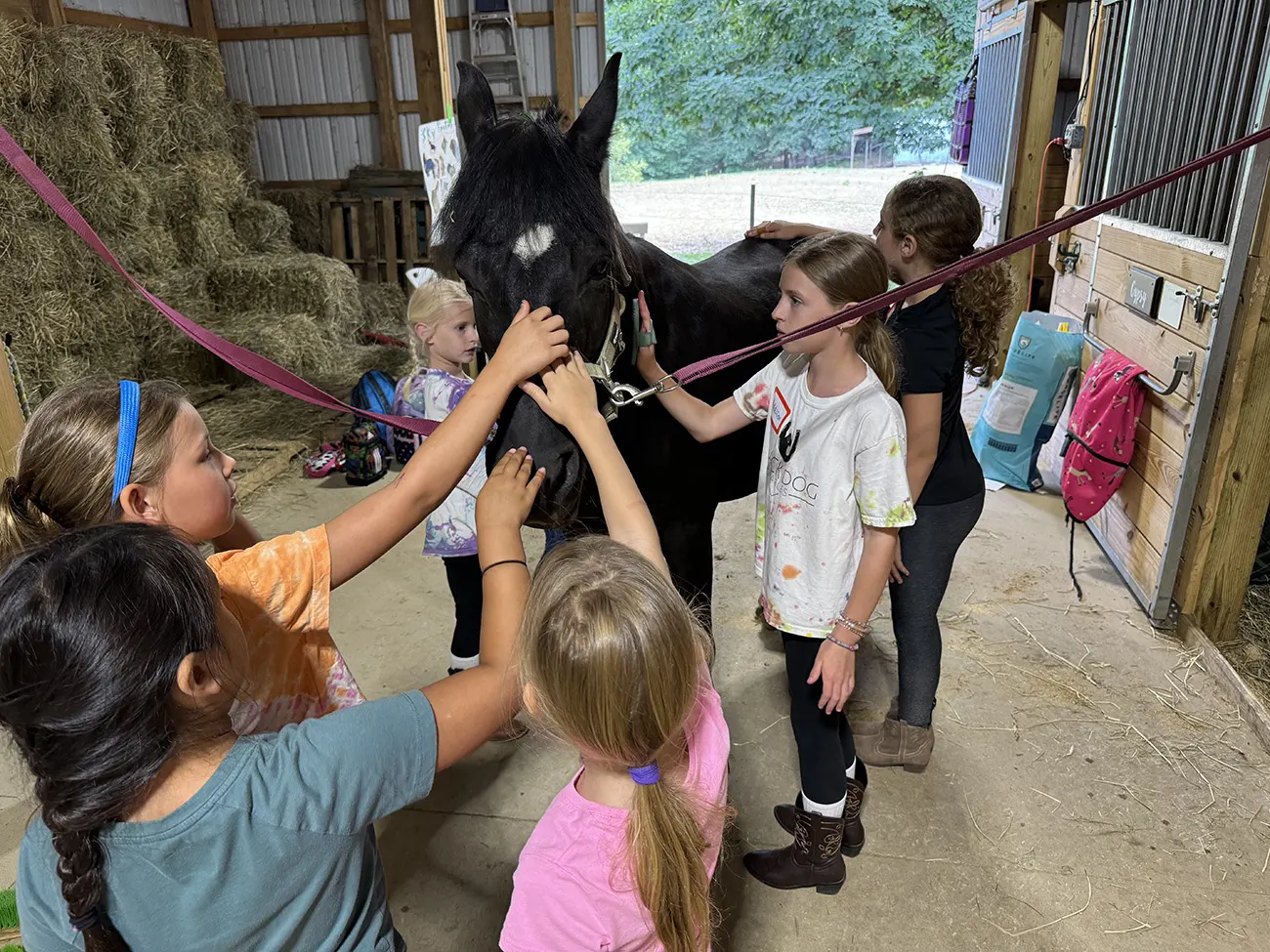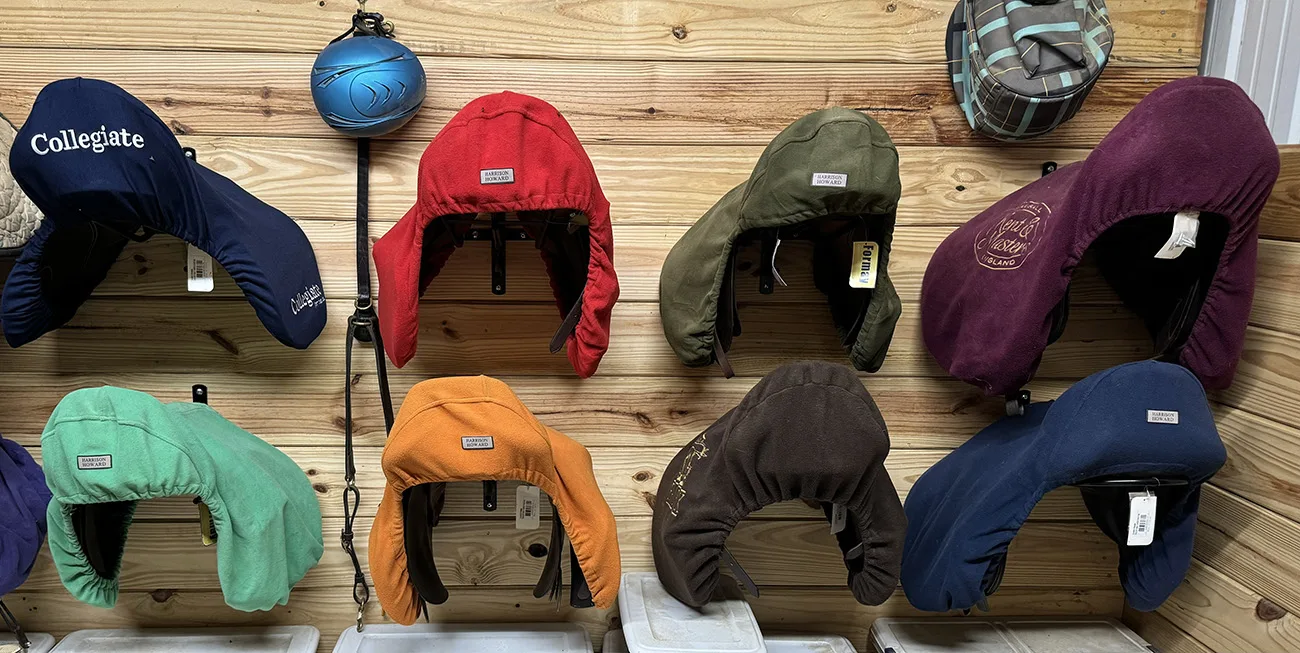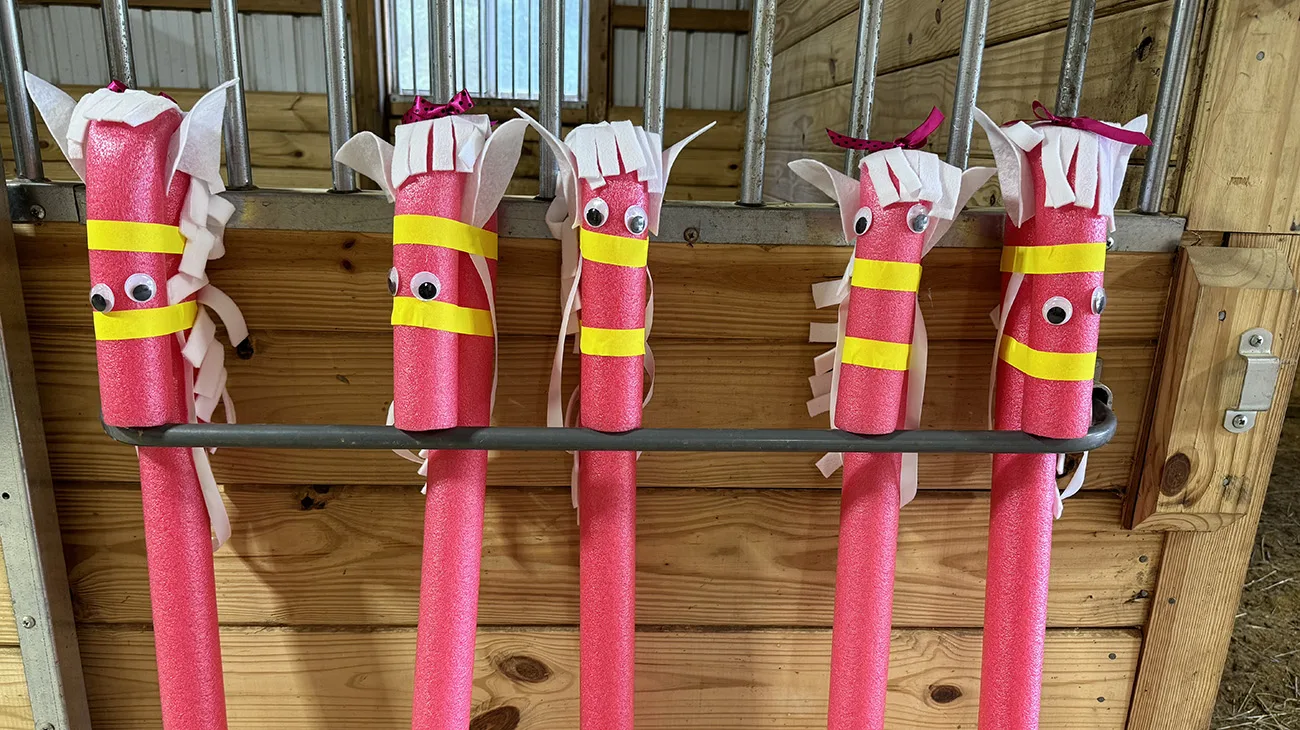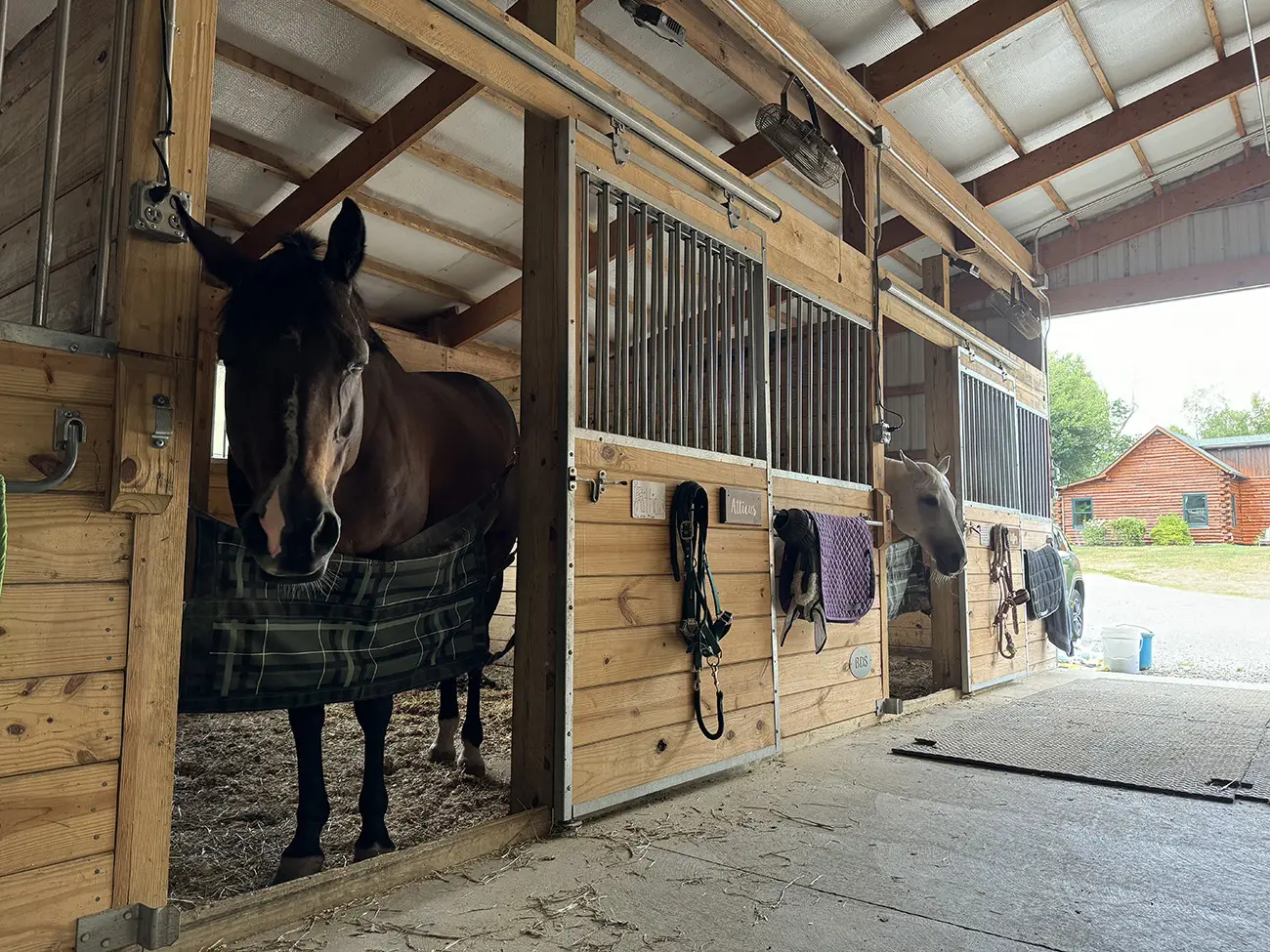It’s horse camp season again, that time of year when so many equestrian programs ask our already saintly lesson horses to go even more above and beyond. Many of us rely on our summer camp income to financially carry our businesses through the slower winter season, so it’s vital that our camps remain successful and profitable. That can only happen if our horses also remain amiable to the experience.
Summer camps are a lot on lesson horses. In our program, our horses are on night turnout through the summer, so their normally quiet daytime barn is flooded during camp weeks with excited, loud, flailing, squealing campers who often don’t know the first thing about equine behavior or body language. We teach these kids how to take care of our horses and treat them with kindness and respect, and by the end of the week, they’re more educated and knowledgeable little equestrians.
But there are also some things that we can do before, during and after summer camps to help make those weeks as low-stress and pleasant as possible on our equine partners, the backbones of our programs.

Before Summer Camp Season
Prior to the start of summer camps, there are several things we do to make the upcoming camp weeks easier on our horses.
The switch to night turnout: In western Pennsylvania, our summers are hot, humid and buggy, so we usually switch to nighttime turnout sometime in late spring or early summer. But that switch to nighttime turnout often makes our horses extra-tired for a few days while their bodies adjust to more time outside. We always make sure that we’re on nighttime turnout at least a few weeks before camp starts so that the horses are adjusted to their new schedule before the busy season begins.
Check tack and equipment: If your camps cater to beginners, think about what you’re asking your horse to tolerate: Novice, unbalanced riders who will, even with the best instruction, lean to one side or another, thunk onto the horses’ backs when mounting, flop around in the saddle, or yank on their reins. And most of us will ask our horses to tote around a few of these newbies each day of camp.
So long before the start of camp, we make sure that our tack and equipment is comfortable, well-fitting, clean and safe. We have a year-round lesson program here at the farm, but during camps we often use more horses simultaneously (especially our beginner schoolies) than we do during riding lessons. So we make sure that we have enough of everything—saddle pads, half pads, saddles, etc.—for all of the horses that will be used at camp. We toss the packed-out half pads, and give worn out saddle pads to the barn cats for beds. We demote grimy brushes from tack boxes to the wash stall to scrub buckets. We fix or toss anything that, in the hands of an uneducated camper, could cause pain or irritation to our horses.
This year, when we bought a new lesson horses and noticed weight and muscle changes in two others, we enlisted a saddle fitter to help check saddle fit. We switched around a few saddles to better fit our horses and wrote up a list of what tack goes on what horse on a whiteboard in the tack room, complete with labeled bridles and color-coded saddle covers.

We also ended up purchasing two new saddles to ensure that each horse had one that fit correctly. It was an expense, but unquestionably worth it to provide comfort to our horses during those longer days of camp.
ADVERTISEMENT
Camp programs can’t afford to skimp on tack or equipment. Poorly fitting, uncomfortable saddles or bridles can cause nasty sores or muscular or skeletal pain, which can also lead to behavioral problems in our horses—if they’re hurting, they have few ways to communicate their discomfort to us. And dirty saddle pads or wraps can cause or spread fungus and bacteria like rainrot, and dirty bridles and bits can also spread disease. Any of these issues can be detrimental to your program’s reputation, so it’s well worth it to make sure that your equipment helps, not harms, your horses’ experiences.
Schedule appropriately: Before you schedule camps, look at the big picture. What does summer look like? Are you going to horse shows in addition to camps? Are you continuing weekly lessons around camp programs? What is fair to ask of your horses?
Consider running camps in chunks. We offer five weeks of summer camps, with the first three weeks happening as soon as local schools are out. Then we take two weeks off to go on our family vacation and give the horses a breather. We do two more weeks in a row, then call it a summer. There are plenty of ways to space camps out: you could alternate beginner kids with more advanced riders, or do one week on, one week off, or alternate weeks of camps with horse show weeks. Scheduling intentionally, no matter how you do it, can make those long weeks easier on your horses.
Enlist your professionals: Prior to the start of camps, we ensure that our horses are visited by their favorite equine pros. Our horses are updated on necessary vaccines long before our first camp. Shots make us all feel cruddy, so we let horses have their vaccines and a day or two of rest well before camp season begins. A visit from the dentist ensures that mouth pain doesn’t add to horses’ stress levels over the summer. A visit from the chiropractor before camp season starts is always a nice treat, and ensures that horses are adjusted and comfortable before they’re asked to tote around campers. And keeping horses on regular farrier schedules keeps all of our equines feeling their best! Keeping up with horse’s daily care—and offering extra when needed— sets the horses up for a successful summer.

During Summer Camp Season
There’s so much we can do in the midst of summer camps to help support our equines through the chaos. We literally can’t do summer camps without them, so anything that we can do, we should do to make their experiences less stressful and more positive.
Schedule conscientiously: In addition to scheduling your summer intentionally, a well thought-out weekly plan can ease the stress on your lesson horses. Take a look at your weekly schedules. Are you just asking your horses to do camps? Or camps and lessons? Do they get time off during the days, or during the weeks?
We do our best to give our horses at least two days off during a seven-day week when we have camps, and time off between camp days and lesson evenings when they do both. Our horses all get at least one day off during summer camp weeks; most horses get two days to just be a horse.
Give extra breaks when needed: We know our horses, and if they need breaks during camp weeks, even if it means adjusting the schedule, we do our best to accommodate their needs. A well-timed day or two off may mean the difference between a horse who is happy to return to work, or a horse who comes to hate his job. If we notice a horse getting tired, or seeming sore, or even just crabby or seeming to need a mental break, we adjust our schedule accordingly and give that horse some down time. This careful attention to our horses’ needs keeps them going—mentally and physically—through our busiest season!
Make the barn their sanctuary: My horses love their stalls, and when the mornings start to warm up, all of our equines are at their gates, ready for their breakfasts, cool drinks of water, and quiet time in front of their fans. But when campers invade the barn—loud, excited, arms reaching into stalls for pets—our horses’ quiet space is no longer quiet.
ADVERTISEMENT

So when camp is over—for us it’s 1 p.m.—we are strict about giving our horses back their space. Children are ushered out to meet their parents while counselors refill hay nets and water buckets, turn fans on and lights off. We give the horses as much quiet as we can between the end of camps and the start of evening lessons. Only on Fridays do we invite campers’ families inside the barn to meet the horses, knowing that the next morning, a quiet barn will be theirs again.
Protect their mouths: We started something new a few years ago when one of our ponies became irritated at all the uneducated hands pulling on her mouth. Though her bit was gentle, she still was annoyed, shaking her head and pulling back when a rider was unintentionally too strong. So we made a switch for camps geared to our youngest, beginning riders: outfitting our horses in either gentle bitless bridles or halters with clip-on rainbow reins.
Our youngest beginner campers are led by a counselor, so each horse has a lead rope clipped to their halter as well. While riders learn to hold their reins and steer, our horses feel like they are just out for a little walk, and the relief this offered them was noticeable and clear. It was a game-changer for the attitudes of the horses who carry our littlest, newest riders.
Make the experience pleasant: Another perk of horses wearing halters and clip-on reins is that they can snack between riders. While our students are rotating between stations, our horses can grab a few bites of hay from one of the hay bags we hang around our arena, or they can grab a drink from the water bucket we keep in the corner.
We have to treat these camps differently from lessons—it’s a lot to ask that our horses tote around beginner after beginner, so we feel it’s a time to bend the rules. Hay between riders? Absolutely. A little cookie from a counselors’ pocket for being patient? For sure. Anything to make summer camps a little more pleasant for our equine colleagues is worth it, in our book!
So here’s to positive vibes as we all navigate through the second half of summer camp season. We hope that maybe some of these tips might help make the experience a little easier on your camp horses, too.
And we’d love to hear about anything else that you do to make your horses’ summer camp days and weeks more enjoyable, too!
Sarah K. Susa is the owner of Black Dog Stables just north of Pittsburgh, where she resides with her husband and young son. She has a B.A. in English and Creative Writing from Allegheny College and an M.Ed. from The University of Pennsylvania. She teaches high school English full-time, teaches riding lessons and facilitates educational programs at Black Dog Stables, and has no idea what you mean by the concept of free time.














